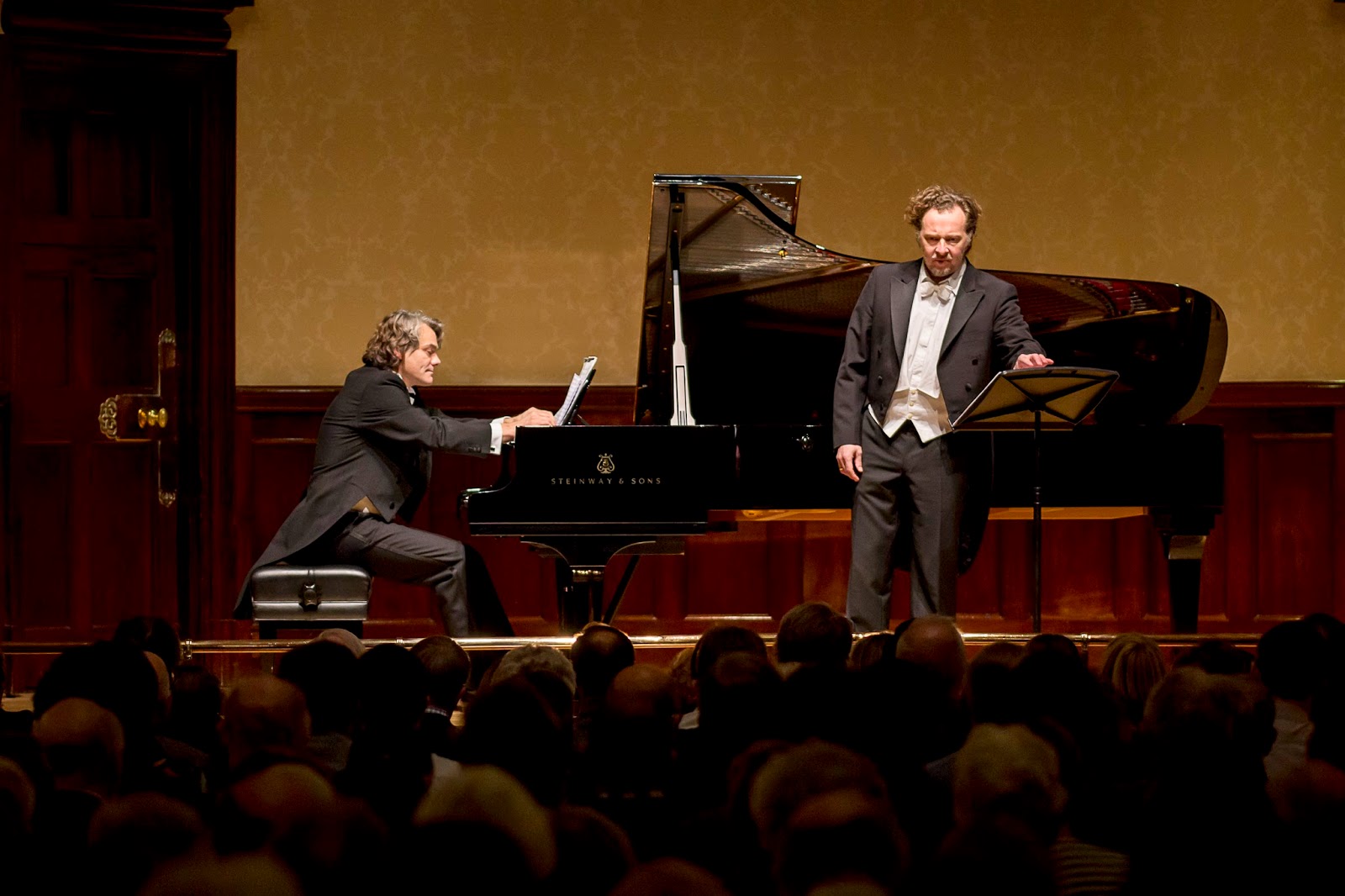Wigmore Hall
Holliger: Elis
Wolf: Abendbilder
Holliger: Lunea
Schumann: Vier Husarenlieder, op.117
Schoeck: Elegie, op.36: ‘An den Wind’, ‘Herbstgefühl’, ‘Verlorenes Glück’, ‘Das Mondlicht’, ‘Herbstentschluss’, ‘Welke Rose’
Schumann: Sechs Gedichte von N. Lenau und Requiem, op.90
Christian Gerhaher (baritone)
Gerold Huber (piano)
Any recital from Christian Gerhaher is likely to be special; offering a range of quite unusual repertoire, Heinz Holliger’s Lunea written for and dedicated to Gerhaher, this was no exception. It opened, though, with a rare solo spot for Gerhaher’s long-term collaborator, pianist Gerold Huber, and early (1961, revised 1966) Holliger. Gerhaher reading the three Georg Trakl texts on which Elis’s three short piano pieces, ‘Verkündigung des Todes’, ‘Todesangst und Gnade’, and ‘Himmelfahrt’, are based, even providing his own English translation for the programme sheet. Strikingly post-Schoenbergian harmony characterised the first, though its musical gestures worked differently. The soundworld of the second sounded later, more post-Webern, if you will, indeed surely marked by Holliger’s contemporary study with Boulez, albeit with a Germanic accent. ‘Himmelfahrt’, as its name might suggest, seemed in some sense both to reconcile and to go beyond. These aphoristic nocturnes emerged pregnant with emotion, gesture, and – who knows – perhaps ‘meaning’ too.
Hugo Wolf’s Abendbilder (again early, 1877) followed, without a break. In context, the piano prelude to the first of the three sons sounded Romantically consoling, yet not unrelated: an excellent starting point for our Wolfram von Eschenbach, sorry Gerhaher, to sing, the sincerity as well as beauty of his delivery striking from the outset, likewise command of detail without pedantry. All three Nikolaus Lenau ‘pictures’ rightly formed part of a greater whole, whilst happily going on their own, sometimes pastoral, ways. It was difficult not to marvel at the different shades and colours of Gerhaher’s voice, poetically deployed, an sinking wanness as the sun set (‘Bald versinkt die Sonne’, an example in point. Shades of Schumann and Liszt in language and performance contextualised without overwhelming.
We remained with Lenau for Holliger’s Lunea, written from 2009-10, though only premiered at Zurich’s Opera House in 2013 (also venue five years later for the premiere of Holliger’s opera of the same name, featuring Gerhaher, reworking these settings ‘like chorales in a Bach Passion’). Notably more gestural than what we had previously heard, it yet remains – and, in performance, remained – within the noble Lied tradition. Twenty-two Lenau sentences and a short poem, ‘Einklang’, in memory of Johann Baptist Mayrhofer form a striking cycle that must surely have won the composer new admirers here in London. Gerhaher’s acuity of verbal and musical response seemed ideally suited. That range of colour was now married to a greater range of general delivery, sometimes unabashed song, sometimes recitation, often somewhere in between; extended piano techniques such as bowing the strings acted similarly. Searching melismata unsettled, lit up, even amused, as instances of wordpainting (‘Ein Tropfen im Stein’) worked something like their traditional magic of recognition. Wonderfully nomadic harmony illuminated Lenau’s Wüstenwanderer, prior to that neo-Schubertian postlude of ‘Einklang’.
I struggle to find Schumann’s Lenau Husarenlieder among his more compelling work, but they received stylish, commanding performances, with a fine degree, where required, of Schwung. Rhythms were well-pointed, and Gerhaher, rightly, I think, permitted a word-driven approach. A selection of six songs from Othmar Schoeck’s Elegie, four to texts by Lenau, Gerhaher imparted a strong sense, even in the others’ absence, of its character as a whole, yet equally individual character to individual songs. Musical process was clear, courtesy above all of the piano, in ‘Das Mondlicht’. The performance as a whole was subtly surprising: no shocks, yet deeply satisfying provided one offered musical attention.
The final Schumann set showed the composer, at least some of the time, the recapturing the infinitely touching spirit of his youth. Gerhaher and Huber offered plenty of variety in the opening, strophic blacksmith’s song, but it was the ensuing ‘Meine Rose’ that played on the heartstrings. Was that perhaps a sense of Schumann influenced by Wagner, or simply memories of Gerhaher’s Wolfram? At any rate, it brought tears to my eyes. So too did the sense of youthful anticipation in ‘Die Sennin’, whilst ‘Einsamkeit’ and ‘Der schwere Abend’ both turned from disquieting ambiguity to ultimate sadness. The final ardour of the strange ‘Requiem’, offered us flame that flickered both in defiance and reconciliation, perhaps like the Lied tradition’s persistence unto Holliger (and beyond?) ‘Zweifeldner Wunsch’ from Schoeck’s Elegie made for a fitting encore, concluding and continuing a line of subtle questioning.
